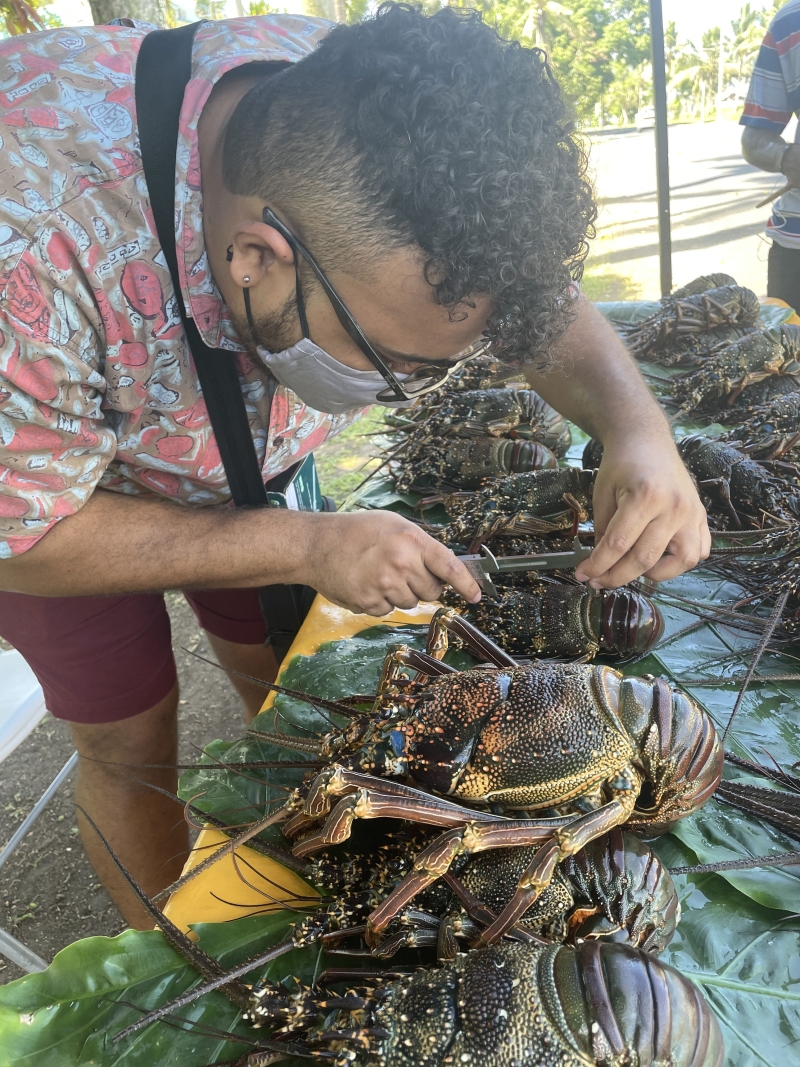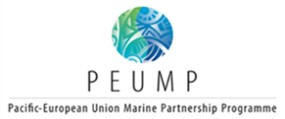Research Finds Lobster at High Risk of Overfishing in Fiji

Small-scale lobster fishing research conducted by the Pacific-European Union Marine Partnership (PEUMP) research team at the Institute of Marine Resources (IMR) of the University of the South Pacific found that three of the five species of lobsters fished along Fiji’s coast are vulnerable to overharvesting and in need of urgent resource management measures and actions. This data was presented on Wednesday 11 November 2022 to Fiji’s Ministry of Fisheries. Lobsters are one of the high seafood commodities sought after in the food and tourism industries. Despite their economic significance, data on lobster fishery in Fiji is scarce.
“Lobsters play key roles in the maintenance of healthy and diverse marine ecosystems as feeders along the seafloor” said Cherie Morris, Assistant Lecturer and USP PEUMP Acting Team Leader. “This data gathered and presented will form a baseline for our partner – the Ministry of Fisheries to formulate management measures to safeguard lobsters as a high-value marine resource and the fishery as a whole.”
The USP PEUMP team made recommendations to having restrictions/enforcements around the harvest methods of lobsters; to have seasonal closures of lobster fishing regulations; no-take of soft-shelled lobsters and female bearing lobsters as well as having an acceptable size limit of harvest.
The data presented in the consultation will create a space for dialogue on the current status of the lobster fishery in Fiji where together, all stakeholders within the value chain can discuss and formulate realistic and practicable management strategies to safeguard Fiji’s lobster fishery. The Ministry of Fisheries Research Division will be working with USP PEUMP team to hold a national consultation with the lobster fishery stakeholders.
USP is one of four key implementing partners of the PEUMP Programme, an initiative funded by the European Union and the Swedish government. The overall EUR 45million program promotes sustainable management and sound ocean governance for food security and economic growth while addressing climate change resilience and conservation of marine biodiversity. It follows a comprehensive approach, integrating issues related to ocean fisheries, coastal fisheries, community development, marine conservation and capacity building under one single regional action. The PEUMP programme is housed within the Institute of Marine Resources within the School of Agriculture, Geography, Environment, Ocean and Natural Sciences (SAGEONS).
About us
The University of the South Pacific (USP) is the premier institution of higher learning for the Pacific, uniquely placed in a region of extraordinary physical, social and economic diversity to serve the region’s needs for high quality tertiary education, research and policy development. One of only two regional universities of its type in the world, USP has 12 member countries: Cook Islands, Fiji, Kiribati, Marshall Islands, Nauru, Niue, Samoa, Solomon Islands, Tokelau, Tonga, Tuvalu and Vanuatu. USP is committed to achieving excellence and innovation for the sustainable development of Pacific Island Countries.
 The Pacific-European Union Marine Partnership (PEUMP) Programme addresses some of the most serious challenges faced by Pacific countries. Among these are the increasing depletion of coastal fisheries resources; the threats to marine biodiversity, including negative impacts of climate change and disasters; the uneven contribution of oceanic fisheries to national economic development; the need for improved education and training; and the need to mainstream a rights-based approach and to promote greater recognition of gender issues to ensure inclusiveness and positive changes for Pacific island people. The seven-year PEUMP programme is funded by the European Union (EUR 35 million) and the government of Sweden (EUR 10 million). It is implemented by the Pacific Community (SPC), the Forum Fisheries Agency (FFA), the Secretariat of the Pacific Regional Environment Programme (SPREP) and the University of the South Pacific (USP) in close collaboration with Non-Government Organisations and the national authorities.
The Pacific-European Union Marine Partnership (PEUMP) Programme addresses some of the most serious challenges faced by Pacific countries. Among these are the increasing depletion of coastal fisheries resources; the threats to marine biodiversity, including negative impacts of climate change and disasters; the uneven contribution of oceanic fisheries to national economic development; the need for improved education and training; and the need to mainstream a rights-based approach and to promote greater recognition of gender issues to ensure inclusiveness and positive changes for Pacific island people. The seven-year PEUMP programme is funded by the European Union (EUR 35 million) and the government of Sweden (EUR 10 million). It is implemented by the Pacific Community (SPC), the Forum Fisheries Agency (FFA), the Secretariat of the Pacific Regional Environment Programme (SPREP) and the University of the South Pacific (USP) in close collaboration with Non-Government Organisations and the national authorities.